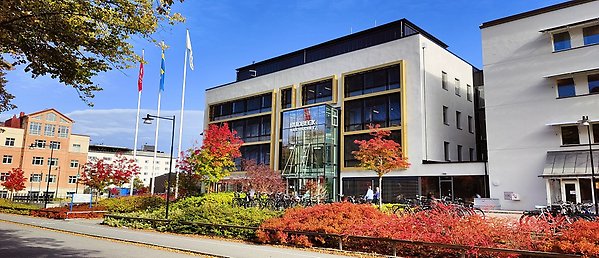Symposium: Science & SciLifeLab Prize for Young Scientists
December 8 @ 09:30 – 15:00 CET
SciLifeLab and AAAS/Science magazine have joined forces in creating the Science & SciLifeLab Prize for Young Scientists to promote young scientists early in their careers. The Prize is awarded annually to four recent Ph.D. graduates for outstanding life science research.
Join us, to celebrate the 2020 and 2021 winners of the Science & SciLifeLab Prize for Young Scientists at the Scientific Symposium, December 8, 09:30-15:00.
The bus from Tomtebodavägen 23 to Humanistiska Teatern departs at 07:45 and from Uppsala to Solna at 15:15.
Hybrid event
On-site, Humanistiska Teatern, Uppsala: The Symposium will include the Prize winner’s presentations, a keynote lecture, lunch, and coffee with the possibility to meet and mingle with the winners and your SciLifeLab colleagues. Many people are interested in meeting IRL again but the seats are limited (100p). Register today! First-comes first served! Please cancel if you can’t come so that the spot can be available for someone else. We have bus transportation from Tomtebodavägen 23 at 07:45.
We need you to register for the on-site event by November 30, at the latest for catering reasons. The registration will be open until we reach the maximum participants (100p), but we cannot guarantee lunch or coffee after November 30. If you have questions, please contact events@scilifelab.se.
Remote: The event will be broadcasted on the SciLifeLab YouTube channel. You don’t have to register for the YouTube broadcast. But if you do, you will get a reminder and a direct link to the event. Don’t miss this scientific symposium where you will meet the 2020 and 2021 year´s laureates and hear about their award-winning research.
The Prize is awarded in the following categories:
- Cell and Molecular Biology
Research in this category includes cellular and molecular processes at levels ranging from single molecule to single cell to tissue and organ systems. - Genomics, Proteomics and Systems Biology
Research in this category focuses on genomics, proteomics, integrative omics and systems biology approaches to facilitate comprehensive understanding of living cells, organisms and species. - Ecology and Environment
Research in this category encompasses interactions between organisms and their environment, and how these processes are influenced by human activity. - Molecular Medicine
Research in this category aims at building on the molecular understanding of disease in humans to develop preventive, diagnostic and therapeutic approaches, including individualized medicine.
Short facts:
Date: December 8, 2021
Time: 09:30-15:00
Venue: Humanistiska teatern, Engelska Parken, Uppsala and streaming to SciLifeLab YouTube channel.
Registration deadline For lunch and coffee, register by November 30, at the latest. Limited seats on site, unlimited participants online
About the Prize
Science/AAAS and SciLifeLab, have joined forces in creating the Science & SciLifeLab Prize for Young Scientists. Both Science/AAAS and SciLifeLab recognize that global economic health is dependent upon a vibrant research community and we need to incent our best and brightest to continue in their chosen fields of research. Considering the difficult economic environment, we feel it is important to provide extra encouragement to young scientists as they begin their scientific careers. Each year, the grand prize winner will receive a prize of US$30,000; each of the three category winners will receive US$10,000. The grand prize winning essay will be published in Science and essays from the three category winners will be published online. The prize is jointly operated by Science and SciLifeLab and is generously sponsored by the Knut and Alice Wallenberg Foundation.
Read more about the prize here.
Watch this video to hear from the 2020 Grand Prize Winner and Category Winners!
About Science/AAAS
The American Association for the Advancement of Science (AAAS) is the world’s largest general scientific society, and publisher of the journals, Science, Science Translational Medicine, Science Signaling, Science Advances, Science Immunology, and Science Robotics. AAAS was founded in 1848, and includes some 254 affiliated societies and academies of science, serving 10 million individuals. Science, founded by Thomas Edison, has the largest paid circulation of any peer-reviewed general science journal in the world, with an estimated total readership of 570,400.
The non-profit AAAS—www.aaas.org—is open to all and fulfills its mission to “advance science and serve society” through initiatives in science policy, international programs, science education, and more. Science further participates in various efforts to provide free access for scientists in the world’s poorest countries.
About SciLifeLab
As a national hub for molecular biosciences in Sweden, SciLifeLab develops and maintains unique research infrastructure, services and data resources for life science. SciLifeLab coordinates research communities in health and environmental science, recruitment and training of young scientists, and fosters collaboration with industry, health care, public research organizations and international partners. The overall aim of SciLifeLab is to facilitate cutting-edge, multi-disciplinary life science research and promote its translation to the benefit of society.
SciLifeLab is jointly operated by its four founder universities: KTH Royal Institute of Technology, Karolinska Institutet, Stockholm University and Uppsala University. About 200 research groups, 1500 researchers and 40 national infrastructure units are associated with SciLifeLab. The two main research centers are located in Stockholm and Uppsala, but national SciLifeLab units exist at all major Swedish universities.
events@scilifelab.se

